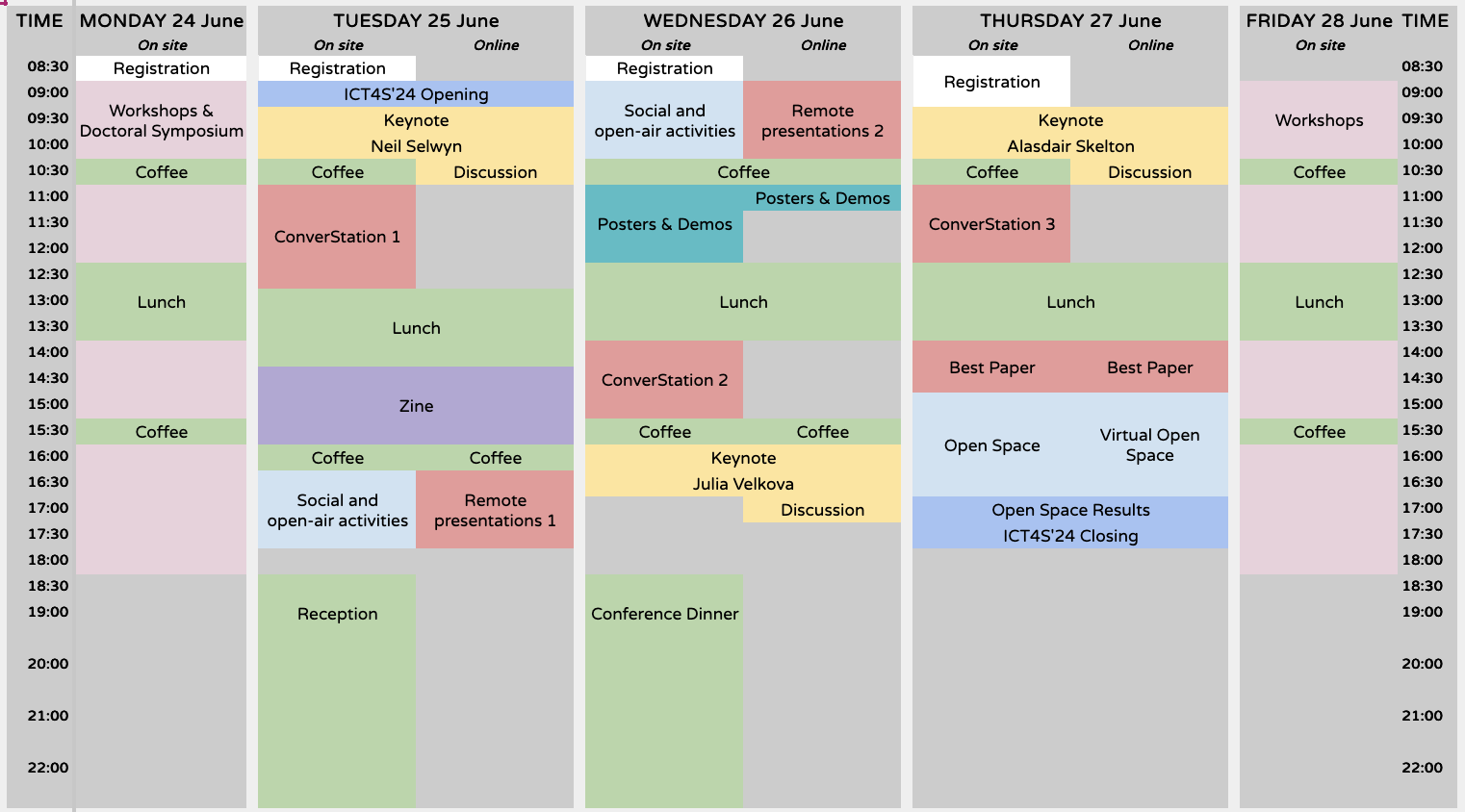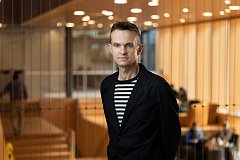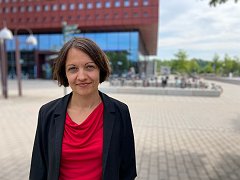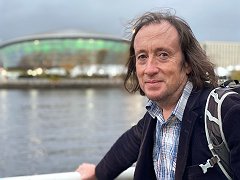ICT4S 2024
Conference Papers
Conference papers are available at IEEE Digital Library: https://ieeexplore.ieee.org/xpl/conhome/10805085/proceeding
Preliminary schedule
You can find the preliminary schedule below.

Keynotes:
Tuesday June 25

Name: Neil Selwyn
Affiliation: Professor in the Faculty of Education, Monash University, Melbourne, Australia
Title: The case for digital degrowth
Description: It is increasingly argued that we are approaching the point of ‘peak digital’, with the continued mass production and excessive consumption of digital technologies set to become a key driver of climate crisis, ecological breakdown and ongoing societal instability. In this talk, Neil Selwyn explores how degrowth thinking and alternate forms of ‘radically sustainable computing’ might support ambitions of sustainable, scaled-down and equitable ways of living with digital technologies. Drawing on the latest thinking from across the social sciences, ecological economics, political ecology, environmental justice, and computer sciences, Neil argues that degrowth thinking offers a compelling basis from which to completely rethink our digital futures in these fast-changing times.
Bio: Neil Selwyn has been researching and writing about digital technology and education since the mid-1990s. He is currently a professor at Monash University, Melbourne. Recent books include: ‘Should Robots Replace Teachers? AI and the future of education‘ (Polity 2019), ‘Critical Data Literacies’ (MIT Press 2023, w/ Luci Pangrazio), and an upcoming book ‘Digital Degrowth: Radically Rethinking Our Digital Futures’ (Policy 2025).
Ѕlіdеѕ: https://conf.researchr.org/getImage/ict4s-2024/orig/DEGROWTH+SLIDES+Neil+Selwyn_compressed.pdf
Wednesday June 26

Name: Julia Velkova,
Affiliation: Associate Professor of Media and Communication Studies / Technology and Social Change, Department of Thematic Studies, Linköping University, Sweden
Title: Making Liveable Relations with AI and the Cloud
Description: Amidst intensifying debates about the possibilities and harms with AI and automated-decision making, their scale of operations and energy requirements are also soaring. Questions that are gaining traction as public concerns about the environmental toll of these systems are rising are for example: how many watts of energy does an AI consume and how large is the carbon footprint of an AI? Julia Velkova will discuss the importance of shifting the perspective on digital “sustainabilities” and the questions that we ask about them; from quantity to process, and from counting emissions to understanding the manifold frictions that undergird the entanglements between digital and energy industries as they attempt to imagine joint sustainable futures. Drawing on a range of examples from Sweden and nearly a decade of research on data infrastructure, Julia discusses the transformation of power relations, societal inequalities, breakages and infrastructural instabilities and frictions that emerge in the space between digital and energy industries in transition. Rather than sustainable futures, it is time to talk about how to make liveable relations with digital technologies.
Bio: Julia Velkova is associate professor of media and communication studies at the Department of Thematic Studies, Linköping University, and a Profutura Scientia fellow at the Swedish Collegium for Advanced Studies. Her work explores the intersection of digital infrastructure and energy politics, and the end of life of large-scale communication networks. She is co-editor of Media Backends: Digital Infrastructures and Sociotechnical relations (with Lisa Parks and Sander De Ridder, 2023) and founder and co-director of the DataLab at Linköping University.
Ѕlіdеѕ:: https://conf.researchr.org/getImage/ict4s-2024/orig/ICT4S+Velkova+v.2.pdf
Thursday June 27

Name: Alasdair Skelton
Affiliation: Professor of Geochemistry and Petrology and Chairperson of Researchers’ Desk, Department of Geological Sciences and Department of Environmental Science, Stockholm University, Sweden
Title: The climate crisis from the perspective of geological time
Description: Geologist Alasdair Skelton was born when the atmosphere contained 325 parts-per-million carbon dioxide and the Earth was 0.3 degrees warmer than it should have been. Today, the atmosphere contains 427 parts-per-million carbon dioxide and human-induced warming has reached 1.4 degrees. This one degree of climate warming would have taken five million years to happen if driven by the natural geological processes that control the carbon dioxide content of the atmosphere. Put another way, humans have become geological actors. Indeed, we are changing the climate upon which we (and the 8.7 million plants and animals we share the Earth with) depend on to survive, at a speed that may be unparalleled in four billion years of planetary history. In this lecture, Alasdair Skelton will begin by reflecting on what the word climate actually means, not only as a meteorological term but also, as it was defined by Aristotle, as a geographical term. He will then frame the climate crisis in the context of the vastness of geological time and, by doing so, he will portray its immediacy. He will conclude by reflecting on how awareness about the climate crisis drives not only geologists, but also other researchers working on climate, to cross the line from academia to activism.
Bio: Alasdair Skelton is Professor of Geochemistry and Petrology at Stockholm University. His published works are on petrology (the study of rocks), earthquake forecasting, climate of the past and the ongoing climate crisis. He was co-Director of the Bolin Centre for Climate Research for nine years (from 2013 to 2021). Presently, he is Chairperson of the Education Board at Stockholm University, and Chairperson of the European Civic University Hub on Climate, Environment and Energy. He is strongly committed and actively involved in educating about geology and climate at all levels from pre-school to research training both within and beyond academia. He is co-founder of Researcher’s Desk, a civil society organization engaged in climate action, which serves as a meeting place for academia and activism.
Ѕlіdеѕ:: https://conf.researchr.org/getImage/ict4s-2024/orig/ICT4S+Skelton+-+Climate+Crisis+from+the+perspective+of+geological+time_p1.pdf and https://conf.researchr.org/getImage/ict4s-2024/orig/ICT4S+Skelton+-+Climate+Crisis+from+the+perspective+of+geological+time_p2.pdf
About the conference
The international ICT4S conference brings together leading researchers in ICT for Sustainability with government and industry representatives with an interest in using, analysing, designing and deploying ICT for environmental and social sustainability. The conference aims to create discussion and movement towards fundamental change in ICT systems among researchers focusing on ICT effects on sustainability and developers of sustainable ICT systems or applications.
In 2024 the conference will return to Stockholm, Sweden, June 24-28. The conference will be hosted at KTH Royal Institute of Technology. June 24 and June 28 are reserved for workshops and doctoral symposium, while the main conference will be on June 25-27.